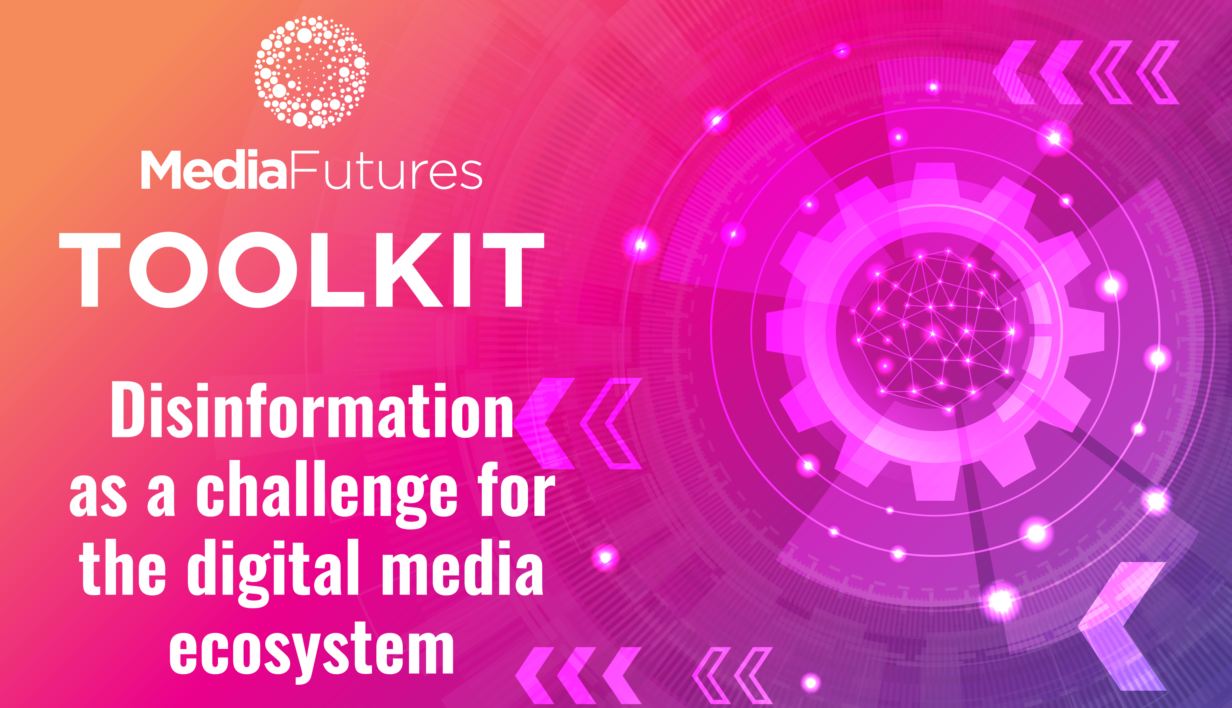14 December 2022
How to use MediaFutures Data Innovation Toolkit

About the MediaFutures Toolkit
The MediaFutures Toolkit is a resource for innovators and artists, and everyone working in-between business and arts. It focuses on art/AI interactions and their application to counter misinformation. It enables the use of the arts, and trans-disciplinary STEAM (science, technology, engineering, arts, mathematics) approaches more widely, to increase understanding of and participation in AI by a larger part of the public. The toolkit is driven by the expertise of the MediaFutures partners across a range of fields, and collates insights gained from the hub work with start-ups and artists in the MediaFutures support programme.
Enabling participation in AI processes, and improving interactions between AI and citizens, helps improve the effectiveness of AI systems. However, the intricacies of AI systems and their function are not always easy to understand for lay people, or easy for experts to explain in a way that lay people can understand. Many factors such as age, gender, education and subject matter knowledge, but also ethical stances on equality, contribute to different perceptions of AI systems (Araujo et al., 2020).
They are more understandable and trusted if they are interactive and respond better to user needs (Liao et al., 2020). Perceptions of AI are further influenced by the proposed profile and competence in interactions (Khapde et al. 2020; Hancock et al. 2020; Bansal et al., 2019), and the risks associated with AI use and the quality of its results (Bansal et al. 2019; Jacovi et al., 2021). All these effects are highly relevant for misinformation, as experiences of AI that users cannot understand contribute to misinformation both actively (through techniques such as deep fakes), and passively (through social media timelines prioritising catchy conspiracy theories).
Part of the solution to these issues are arts-AI interactions. The arts are better able to communicate such issues to users in an accessible way, and allow them to experience such effects in a relatively safe environment. This in itself is useful, but becomes even more powerful when combined with traditional methods in the sciences: together, arts and sciences can create new methods and ideas, new approaches to both development of and communication about AI systems, all of which will help alleviate the effects of misinformation on our society - while also generating value.
How to use the toolkit
The toolkit offers practical advice and guidance to participants of the MediaFutures support programme and those who could apply for it, and programmes like it, in the future. It collates resources that are useful for businesses, artists, and combinations thereof, to address challenges of misinformation through data and AI solutions. The primary audience of the toolkit therefore includes:
- entrepreneurs and artists that want to build new, sustainable data driven business models with a social or civic outlook;
- organisations that wish to collaborate with artists to generate increased value and reach of innovative products and services;
- artists who wish to collaborate with organisations to support digital democracy, citizen engagement, or science education through digital innovation.
The toolkit could further be useful for:
- professionals, such as journalists or other public content creators, wishing to increase user generated content and its diversity, and implement best practices against dis-/misinformation;
- in-house legal teams of startups and SMEs and those engaging in user-research and data-driven experimentation raising specific ethical questions;
- civil servants or government departments wanting to facilitate successful citizen engagement around data, innovation, and dis-/misinformation;
- NGOs and other non-profit organisations that wish to achieve impact via the social media value chain.
The toolkit is structured in five main sections, covering different aspects of data innovation. Each section offers expert insight and guidance, relevant tools, and case studies. There is no need to read the entire toolkit (unless you want to, of course). The content is arranged topically, to allow readers to jump straight to the areas they are most interested in.
- Section 1: Human/AI interaction focuses on the technical development context. This will be most relevant for entrepreneurs, artists or professionals who want to use AI to counter misinformation, set up successful collaborative environments, or learn about these processes.
- Section 2: Data and AI regulation focused on legal restrictions around AI and data. This will be most relevant to entrepreneurs and artists wishing to understand what rules they need to be aware of when developing AI and using data, and legal teams working with them. Note that MediaFutures focuses on European legal frameworks only.
- Section 3: Entrepreneurship & sustainable business models focused on how to make businesses that develop AI both successful and sustainable. This will be most relevant for entrepreneurs and business managers who seek to set up new businesses or products in the AI market.
- Section 4: Citizen Participation focuses on the ways in which citizens can participate in innovation activities. This will be most relevant for artists and entrepreneurs, as well as organisations who want to use participatory methods in their development.
- Section 5: Science-art interfaces and innovation focuses on the ways in which artists engage with data and AI. This will be most relevant to artists who want to use AI in their work, as well as entrepreneurs or organisations who wish to work with artists.
- The Supplementary material includes additional details about MediaFutures and its participants, the terms and references used throughout the toolkit, and the toolkit authors.
We hope that this toolkit supports all its readers in developing more successful projects, artworks, products and businesses. Any and all comments are welcome, and can be sent to mediafuturestoolkit@gmail.com.